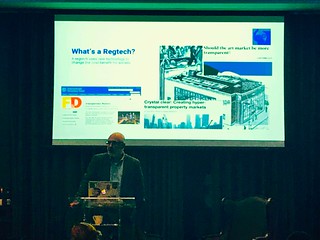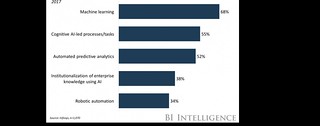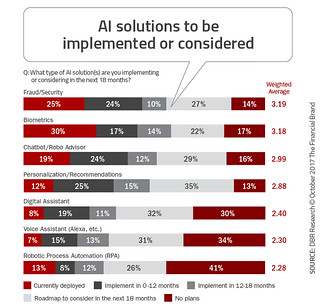As I’ve written many times (e.g., here), it is difficult to overestimate the impact of artificial intelligence (AI) on the financial services industry. As Wired magazine said, "it is no surprise that AI tops the list of potentially disruptive technologies”. With Forrester further forecasting that a quarter of financial sector jobs will be “impacted” by AI before 2020, there’s an urgent need to develop strategies in this. It is because the need is so urgent that I was delighted to be asked to give a keynote at the Digital Jersey AI Retreat in September, an event was put together by my good friends at Digital Jersey (where I am advisor to the board) working with Cognitive Finance. They did a great job of bringing together a spectrum of both subject matter experts and informed commentators to cover a wide variety of issues and provide a great platform for learning.
In “Radical Technologies”, Adam Greenfield wrote of the advance of automation that many of us (me included, by the way) cling to the hope that “there are some creative tasks that computers will simply never be able to peform”. I have no evidence that financial services regulation will be one of those tasks, so in my talk I suggested AI will be the most important “regtech” of all and made a few suggestions as to how regulators can plan to use the technology to create a better (that is faster, cheaper and more transparent) financial services sector.
Regulation, however, was only one the topics discussed in a fascinating couple of days of talks, discussions and case studies. The surprise for me was that there was a lot of discussion about ethics, and how to incorporate ethics into the decision-making processes of AI systems so that they can be audible and accountable. I hadn’t spent too much time thinking about this before, but I was certainly left with the impression that this might be one of the more difficult problems to address and talking with very well-informed experts. Although I must say that the most surprising discussion of the event that I was personally involved in took a very different tack: whether AIs employed in the service of financial institutions should come under the HR department or the IT department!
OK. So banks are going to be disrupted by AI. But where to start? I happened to be reading Call Credit’s interesting white paper “Credit, Fraud and Risk in the Age of Machines”. Their data scientists explore the use of machine learning in credit risk and fraud prevention. It’s that latter category that interests me most at the moment simply because fraud is so out of control, so I began to wonder whether this new technology is having any impact. Are Call Credit right to be optimistic about machine learning? The answer seems to be that they are, and that there may be light at the end of the tunnel. If we look at what AI is being deployed in the banking sector and what is it being used for, we see this optimistic reinforced.
Let’s look in more detail. First of all, AI is an umbrella term so we need to be a little more specific. The most recent figures seem to indicate that the technology of machine learning is the main area of investment in banking. This is not surprising, because machine learning thrives when fed wast quantities of structured data. Banks have this in spades but have historically found it difficult to extract wisdom from it.
What are they using these machine learning systems for? Well, fraud does indeed seem to be the main business case with identification and authentication (including the use of biometrics) the highest priorities. Chatbots, robo-advisors and digital assistants are all fun, but in terms of making an impact on the bottom line, doing something about fraud beats everything else.
Hence my optimistic interpretation. Identity is a mess, but we may be able to use AI to begin to mitigate some of the effects of this in the banking sector. Dave Webber, Director of Concept Management at Call Credit, sums it up nicely in their white paper by saying that “machine learning can help businesses make decisions by looking at data patterns… then looking for anomalies that indicate something isn’t right”. AI is good at this sort of pattern recognition and, I think, so much better at it than we are that it might even outsmart the fraudsters.



Comments
Post a Comment